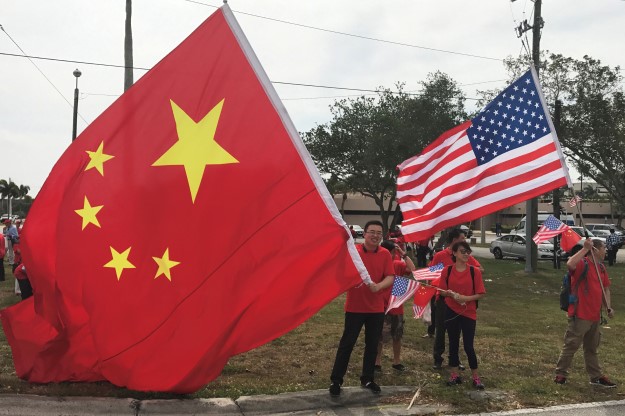This article is adapted from AQ’s latest issue on China and Latin America
China’s entry into the Americas is the most significant issue this century in hemispheric affairs. Relations that were at first considered one-dimensional and transactional, based on the exchange of commodities for manufactured goods, are now consolidating into a vast array of economic, political and geostrategic interests. China is looking at Latin America with a horizon of 20, 50 and even 100 years. The question is: How worried should Washington be? And what should it do in response?
Some people dismiss Washington’s concerns as fearmongering, or the inevitable lamentations of a superpower that is losing regional influence to a rival. But there are real, specific reasons for both Republicans and Democrats, and of course Latin Americans themselves, to be worried about the particular way that Beijing is expanding its influence in the region. A clear-eyed look at recent events shows how change has been dramatic and, at times, unsettling.
Since the beginning of this century, a number of Latin American and Caribbean nations have rushed headlong to develop relations without fully understanding the consequences of meaningful engagement with the world’s largest communist state. The consequences continue to affect the region, even as some governments try to undo China-related commitments agreed to by their predecessors. Some nations, like chavista Venezuela and Ecuador under Rafael Correa, went to the extreme, handing China the keys to their respective nations in return for massive financial support, allowing them to pursue destructive national populist projects. Cristina Fernández de Kirchner invited China to establish dual-use military bases in Argentina for space-related power projection. Brazil under Workers’ Party leadership leveraged bilateral relations with China into a larger, sometimes anti-Western, global governance role. Others, including Costa Rica, the Dominican Republic, El Salvador, and Panama, changed diplomatic recognition from Taiwan to Beijing in anticipation of large financial windfalls including infrastructure projects, the terms of which — and the beneficiaries — remain murky.
As Latin American politics have shifted and relations deepen based on experience and more realistic expectations, a number of nations, Brazil and Ecuador among them, are now attempting to rebalance their relations before they become permanently skewed and disadvantageous. Leaders increasingly understand that they must now proactively shape their respective nation’s engagement, seeking to structure relations with China in a manner that will promote cooperation that is truly win-win — while limiting the increasingly evident negative aspects that may otherwise be unregulated, asymmetrical and opaque. In the end, those nations with strong institutions, transparent political debate and adherence to the rule of law will generally be in a better position to develop sound, healthy relations with China over the long term.
Cost of doing business
That was essentially the message delivered by former Secretary of State Rex Tillerson on February 1, 2018, at the University of Texas on his way to visit the region. Remarks remembered for the secretary’s calling out China as a “new imperial power” and his invocation of the Monroe Doctrine during post-speech questioning were nonetheless clear-eyed about China’s emerging role and the difference between the Western democratic and Chinese communist models. “China’s offer always comes at a price,” said Tillerson, “usually in the form of state-led investments, carried out by imported Chinese labor, onerous loans and unsustainable debt.” He went on to say that “China is gaining a foothold in Latin America. It is using economic statecraft to pull the region into its orbit. The question is, at what price?”
This was a dramatic departure from the Barack Obama administration, whose senior officials repeatedly suggested that Chinese engagement in Latin America and the Caribbean was a net positive because, as former Commerce Secretary Penny Pritzker told the Council of the Americas’ annual Washington Conference in 2014, there is enough investment opportunity to go around — and the need, particularly in infrastructure, is significant.
This was true, but perhaps it missed the point. Significant questions arise about the terms under which Chinese investments are made, the sensitivity that might be paid to issues of corruption, labor rights, and environmental protection, and, of course, the degree of political influence that Beijing may gain with the announcement and potential completion of massive infrastructure projects. Many declared projects are never actually completed, such as the “dry canal” across Colombia, a new interoceanic canal across Nicaragua or the transcontinental railroad linking Brazil’s Atlantic coast with Peru’s Pacific coast. When projects are completed, frequently built with imported rather than local labor, the quality is often substandard, as has been the case from hydroelectric dams in Ecuador to housing projects in Venezuela to municipal buildings and stadia in the Caribbean, leaving host nations with inferior infrastructure under crushing loans that must subsequently be repaid regardless of the utility of the final project. There is a growing chorus of observers in emerging markets worldwide pointing to exactly this phenomenon as the true nature and cost of the much touted Belt and Road Initiative (BRI), a Chinese project that has at least rhetorically now been extended to the Western Hemisphere. At what price, indeed?
Which is not to say that the United States has always lived up to its ideals over the years with its regional engagement, either. Most observers no doubt have their own favorite example of U.S. overreach in the hemisphere through the years, at least up until the end of the Cold War when official U.S. perspectives on Latin America and the Caribbean fundamentally changed. Nonetheless, the arc of engagement since then has broadly bent toward democracy and development, and the contrast with China is stark. Economic relations are far more balanced than mercantilistic, and U.S. trade and investment come with transparency, anti-corruption requirements, labor and environmental protections, job creation on the local market, tax compliance, and corporate social responsibility activities, to name just a few. U.S. companies do not routinely engage in predatory intellectual property theft or efforts to coproduce with foreign companies only to gain sector-specific insights for copycat production that is then priced to undercut the original producers. More importantly, Washington maintains a more holistic view of the region that extends far beyond commercial exchange.
For its part, Chinese engagement with Latin America and the Caribbean clearly has brought benefits in terms of trade and economic relations, even keeping South American commodities exporting nations out of recession during the 2008–2009 global economic crisis. That’s significant. But China seems not to care that much about the state of regional democracy or development; its mercantilist economic model directly undermines regional development by emphasizing primary goods purchases and sales of value-added products. Meanwhile, its political and economic support for authoritarians, as in Venezuela, has been a key enabler in the full destruction of that nation’s democracy.
There is also a potentially darker side to evolving relations that has yet to be fully explored and understood. In a word (or two), China is actively building its relations with emerging markets including Latin America and the Caribbean based on sharp power, a concept first developed by Christopher Walker and Jessica Ludwig of the National Endowment for Democracy in an important December 2017 report. Sharp power is the use of state resources intentionally and proactively to manipulate behavior and actions in foreign states by distorting the domestic political environment and degrading independent institutions. It differs from so-called hard power, the ability to coerce other states through the use of force, and soft power, which is the projection of positive examples that others willingly seek to emulate and adopt as their own.
Indeed, China has very effectively developed an expanding sharp power profile in the Americas that goes well beyond trade and investment, separate and apart from the BRI, which has drawn the most attention. Until such aspects of Chinese engagement are better understood, it is difficult for business and political leaders, among others, to determine how to develop adequate responses.
Beijing boasts a suite of state-led activities designed to bend hearts and minds toward the Chinese Communist Party worldview on core interests such as Taiwan, Tibet, internal human rights issues, and the South China Sea, among others. These range from targeted, state-sponsored media, to language training and elite-targeted cultural exchanges, to Chinese political entities disguised as commercial ventures or as grassroots civil society initiatives, to more insidious activities such as cyber-adventurism and intentional engagement with and support for authoritarian regimes.
Beijing also seeks to spread an external message of benign equivalence between the communist and democratic systems, to put China on equal footing with the United States and Europe, in particular, and to encourage flexibility on international affairs among Latin American and Caribbean nations and support for China’s global ambitions. Deep engagement with authoritarian states such as Venezuela and Cuba also allows China to project influence into a region where it traditionally has had little, to sell security equipment and services to willing client states, and to export a governance model such as the one China itself is already implementing for internal security and state control of society through advanced technology and artificial intelligence.
Seen through a sharp power lens, the let-a-thousand-flowers-bloom approach to Chinese state-directed investments in infrastructure, technology, extractive industries, and other such sectors begins to look very different. It creates conditions that can corrode the norms of economic openness and democratic accountability. It has also enabled populist authoritarian governance that has fed corruption and increased debt, while supporting leaders inclined to pursue an anti-democratic path contrary to international obligations.
Building bridges or walls?
Clearly, the region is at an inflection point in terms of its relationship with China, and the United States has rightly sought to differentiate between systems, working to position itself as the “preferred” partner for Latin America and the Caribbean. Most Latin and Caribbean citizens would likely agree — they do prefer the United States to China — so long as the United States actually presents itself as a true partner of the region and not simply a scold telling the citizens of the Americas with whom they can build relations and trotting out the obsolete Monroe Doctrine from 1823 for good measure.
Tellingly, while China seeks more trade with the region, the United States pulls out of the Trans-Pacific Partnership, renegotiates NAFTA with neighbors Canada and Mexico under threat of withdrawal, and proposes to review remaining trade agreements, too. While China talks of bridge building, the United States shuts down its own government in order to build a wall on its border with Mexico. And so it goes.
In politics, there is a saying that you can’t beat something with nothing. The United States can compete and win the battle of ideas in the Western Hemisphere, but to do so Washington must contend more actively for the entire hemisphere, beyond the trouble spots, and see the region as primarily an opportunity rather than a significant threat. Restoring an active, meaningful, multilateral trade agenda would be one important place to begin. Another would be increasing, rather than decreasing, the foreign assistance that Washington makes available to the region each year, including the Caribbean. And finally, shifting the rhetorical approach toward the region from “rapists and murderers” to “neighbors and friends” would truly be, well, win-win.
The path is clear, but we have to choose intentionally to take it. Until we do, the Chinese flag will continue its inexorable, disruptive, and expanding march across the hemisphere.








